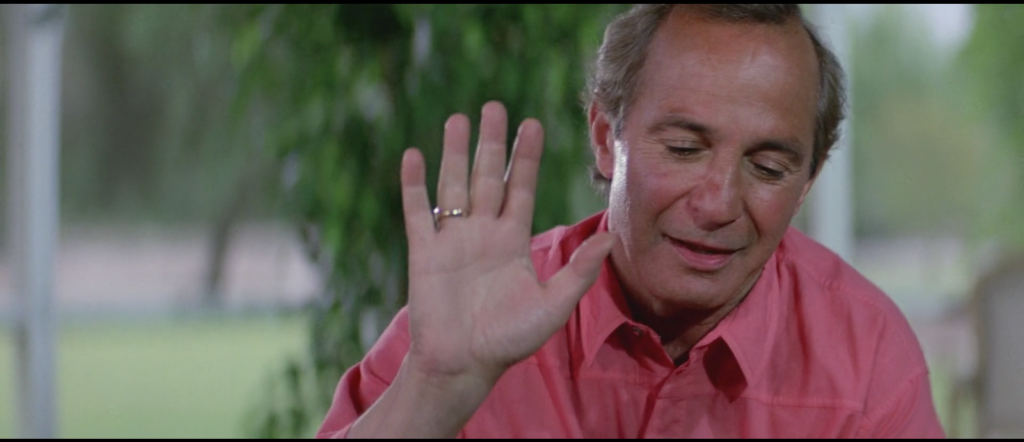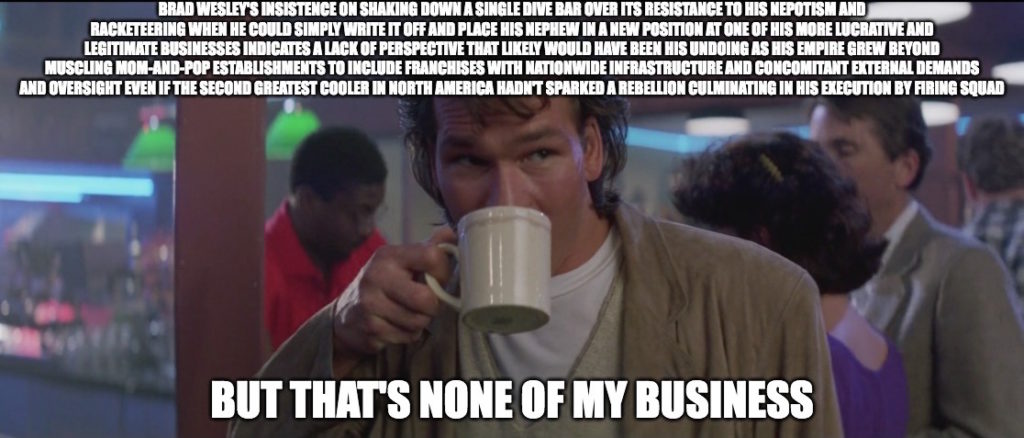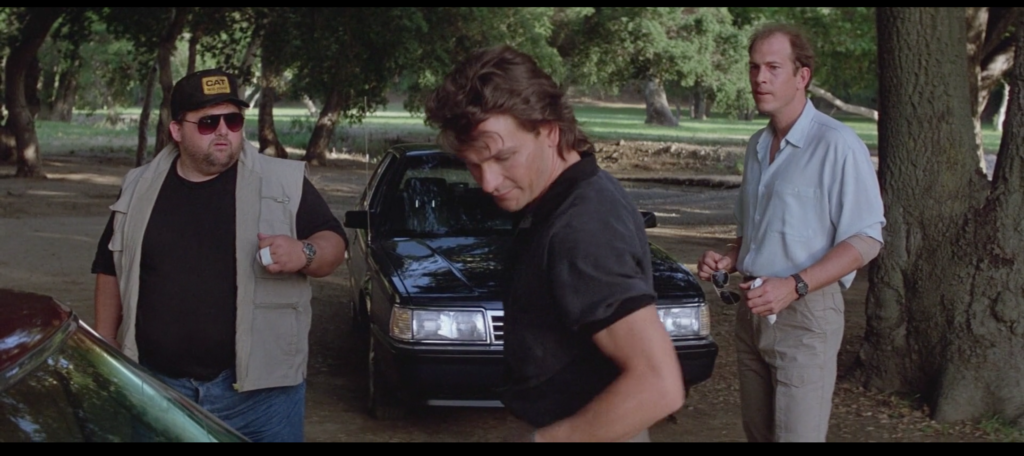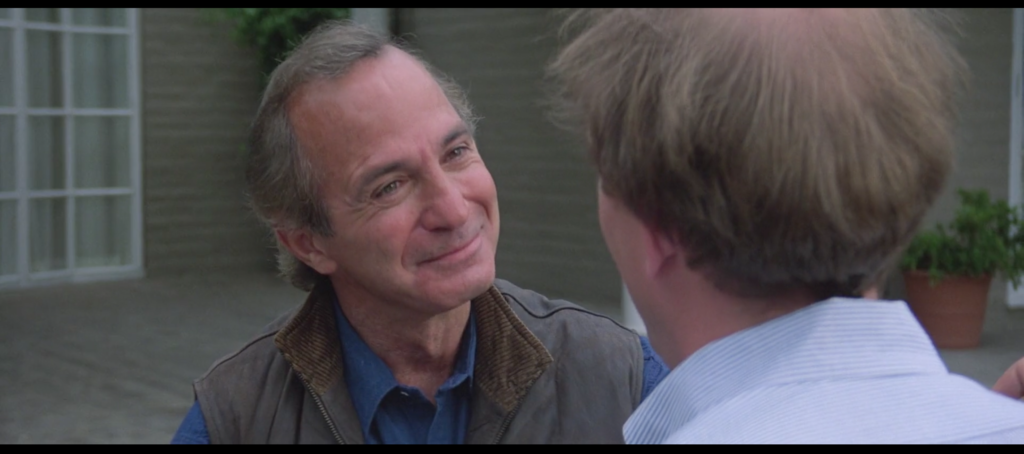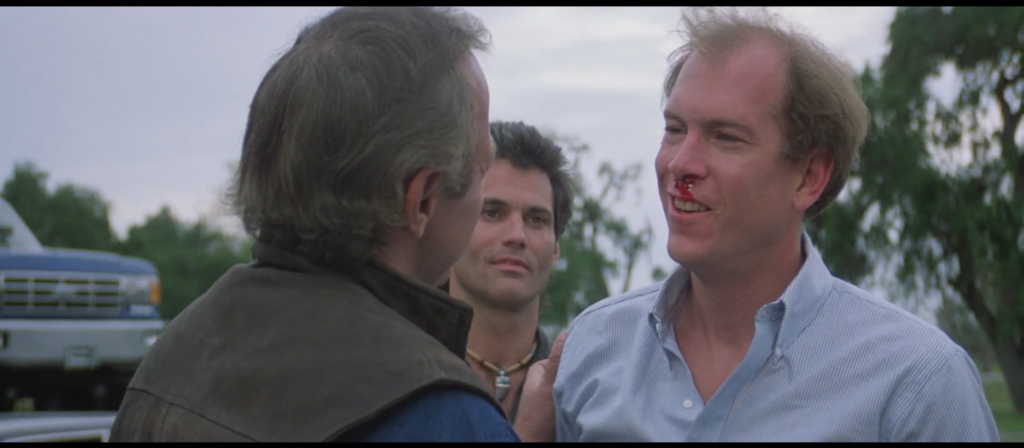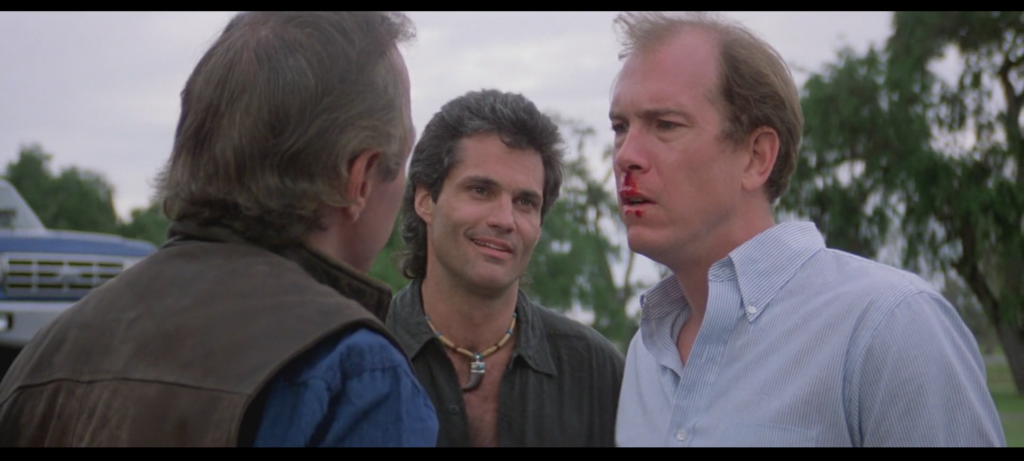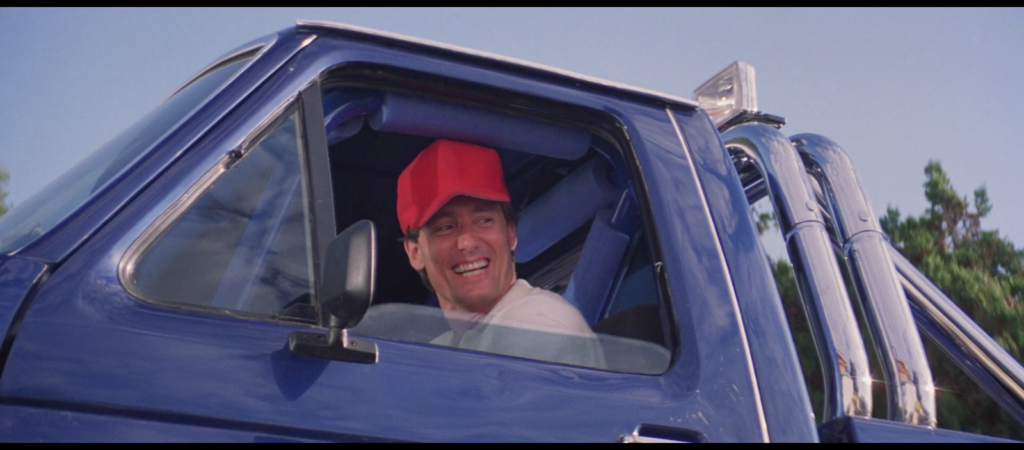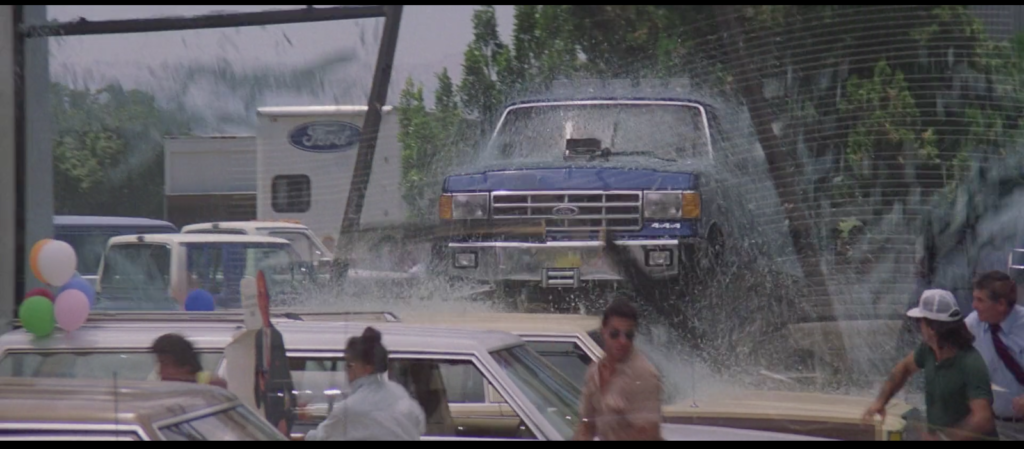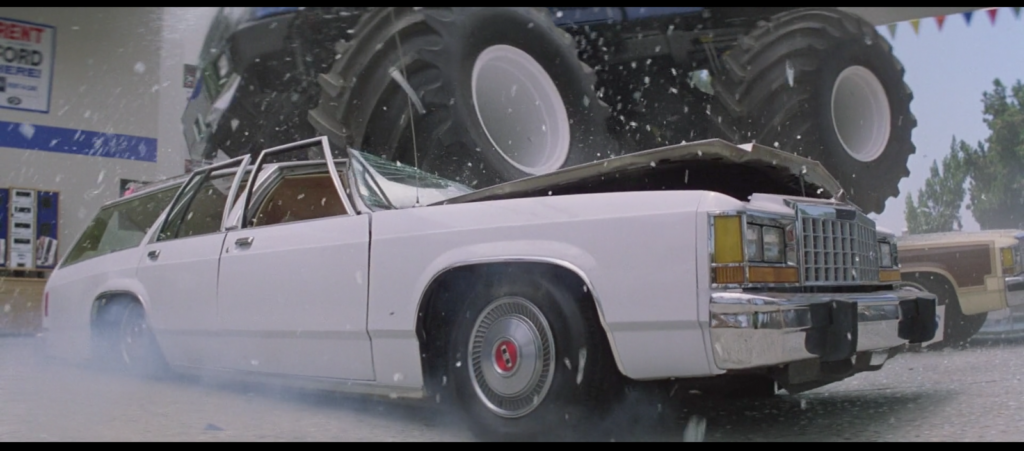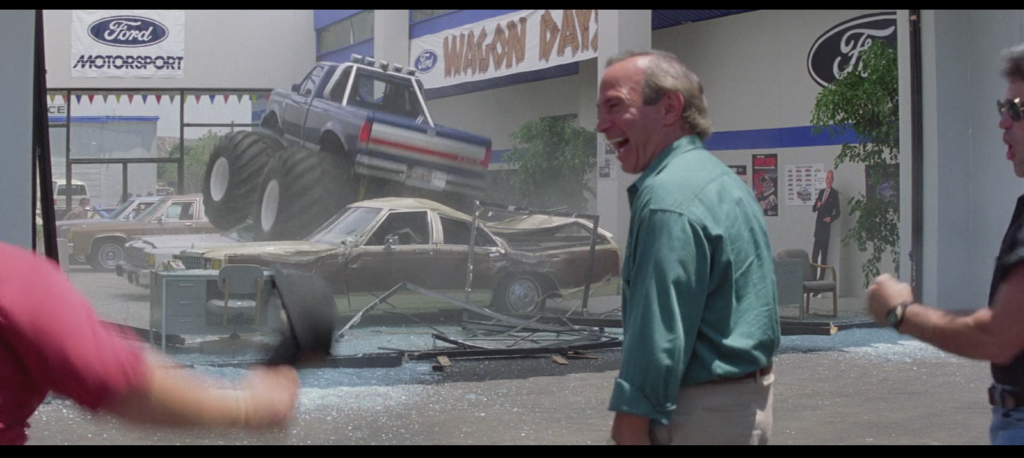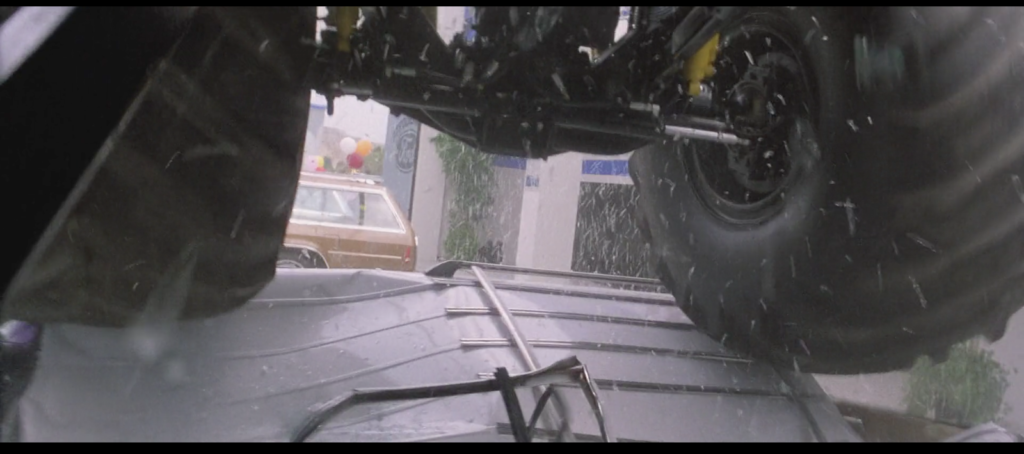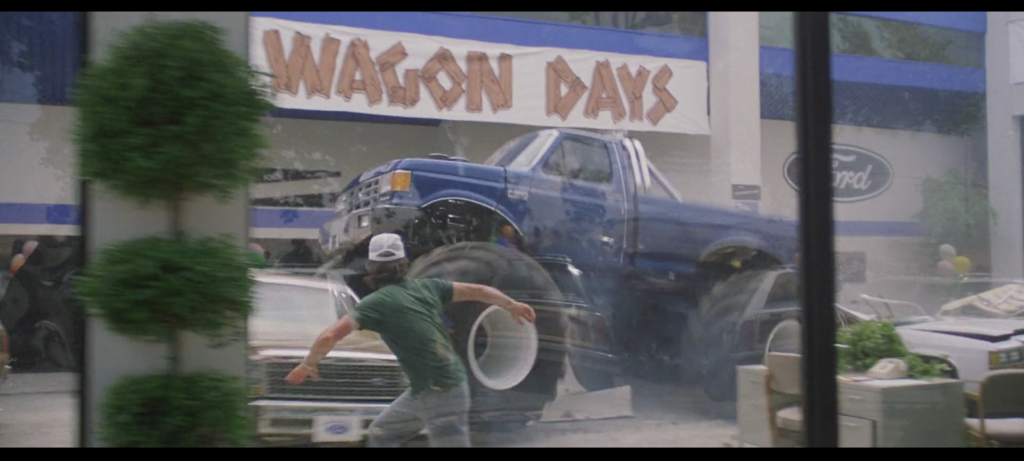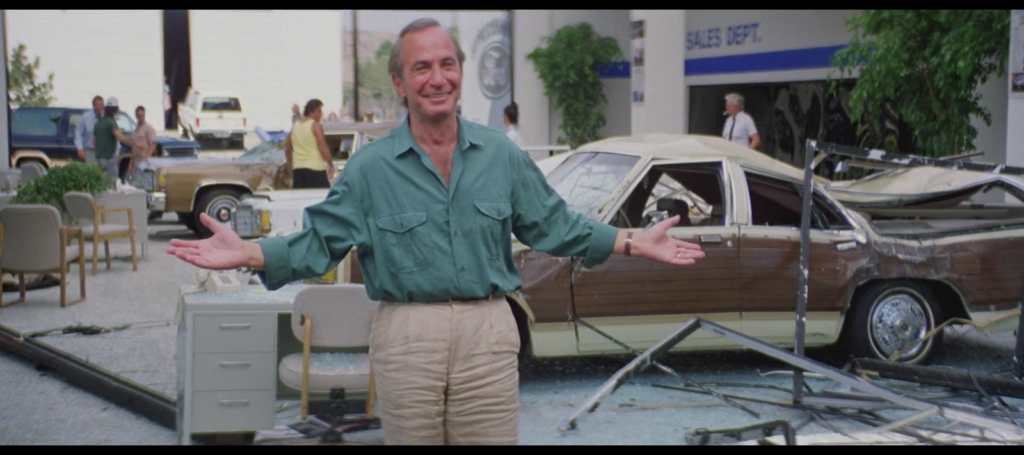Posts Tagged ‘brad welsey’
184. Wesley Say Relax
July 3, 2019“Relax, relax!” says Brad Wesley at the precise midpoint of the film Road House—57:02 down, 57:02 to go. He’s telling his guest, Dalton, to chill out about the whole “this guy just sent his goons to pick me up and paraded me past his abused girlfriend so he could sit me down in his breakfast nook and tell me he thinks I murdered a man in cold blood” thing. I’d probably tell him to relax too, if I saw him getting up from his chair in anger and believed him to be a remorseless killing machine!
After Dalton gets up, fuming, Wesley does his RELAX, DON’T DO IT bit and then asks, purely hypothetically of course, how much money it would take to get Dalton to come work for him if he had a bar that needed cleaning up.
“There’s no amount of money,” Dalton says, and storms out.
And I will say this for Road House: The midpoint of the movie—the turning point, if you will—really is the midpoint of the movie.
This scene is where it stops being a job and becomes something personal. This scene is where it stops being time to be nice and starts being time to not be nice. This scene is where Dalton starts to break his own Three Simple Rules. This scene is where the Dalton Path diverges in a breakfast nook and Dalton begins to take the one less traveled by, perhaps because it is littered with corpses. Relax? Don’t do it.
173. And that’s tea
June 22, 2019163. Bad goons
June 12, 2019Call me old fashioned, but I believe that when the insane 7-Eleven franchisee who pays you to beat people up sends you to pick someone up and bring that person to him for a conversation, and that person gets up to go with you, you shouldn’t flinch like he just pulled out a gun. Yet that is certainly the reaction of Tinker and the Bleeder when, after Tinker says “Mr. Wesley wants to see you. Let’s go,” Dalton…gets up to go see Mr. Wesley.
This is the one time in the entire film when Tinker and O’Connor do a job that does not immediately go amiss, but their loser mindset has conditioned them to expect a beating no matter what. If they’d offered Dalton a handshake and he reached out to shake hands in response they’d burst out in flopsweat while pulling out a bowie knife. If they’d asked Dalton out on a date and he showed up to the date they’d shoot at him through the window of the diner.
You could chalk this up to Dalton’s martial prowess, with some justification. I mean, you can see what happened to them the last time they tangled with the cooler the moment you look at them. But I think that when it comes right down to it, Brad Wesley does not have a good eye for talent. Does he not say so himself when, following the defeat of Tinker and O’Connor and Pat McGurn in their attempt to restore the sister-son to his job at the Double Deuce, he ruefully acknowledges he should have sent Jimmy, one of two or three goons in his employ who’s actually good at his job? (Karpis very effectively trashed Red Webster’s auto shop in his sole observable mission, and while Ketchum lost in humiliating fashion in the parking-lot brawl, he winds up running over a car dealership with a monster truck and murdering Sam Elliott.)
Small wonder the purpose of this go-see is to try and hire Dalton away from the Double Deuce. Wesley can read the bruises and gashes all over his employees just as well as Dalton can, though admittedly in O’Connor’s case he’s responsible for at least as much damage himself.
But that ship has sailed. By hiring Dalton as his first act in the creation of the new Double Deuce, and also by establishing a bridge to Wade Garrett via Dalton, Frank Tilghman once again proves himself the town’s true visionary. He is a man who builds power; Wesley, who parasitically feeds off the town just as he coasts on the hard work of the founders of JC Penney and Fotomat, can only buy it piecemeal. In the time it would take him to accrue enough Tinkers and O’Connors to take down the likes of Dalton, the fight would already be lost.
036. Bleeder
February 5, 2019I want to tell you a story of a man and his bleeder.
The man is Brad Wesley—sportsman, outdoorsman, liquor distributor, civic leader, JC Penney franchisee. The bleeder is O’Connor, the goon upon whom Brad Welsey’s disfavor falls, to his great misfortune.
The scene in which Wesley beats O’Connor, ostensibly for failing to defeat his newfound enemy Dalton and restore his nephew Pat McGurn to his position as bartender at the Double Deuce but for the stated reason that O’Connor bleeds too much (?????????), is a fanmaker. It’s up there with the first deck-clearing barfight, the realization that Dalton visits four separate salesmen of cars and/or car parts, the Giving of the Rules, Doc’s Dress from an Italian Restaurant, “pain don’t hurt,” you name it. It’s even more of a fanmaker if you are, as you should be when you watch Road House, fucked up. It whipsaws back and forth from one emotion to its diametric opposite so fast and so often that it makes you feel fucked up whether you are or not. Only the lag time in comprehension caused by chemical intoxication comes close to replicating the Bleeder Scene’s otherwise inimitable psychological Gravitron.
We’re going to take it frame by frame.
The goons roll up to Brad Wesley’s mansion. Among them are Pat McGurn, Tinker, and O’Connor, the three men defeated by Dalton and his bouncers at the Double Deuce the previous night. Ketchum and Karpis, who are never referred to by name in the film, arrive separately in the monster truck.
Wesley and his right-hand man Jimmy exit his mansion to greet their visitors. Wesley is holding a half-smoked cigar. Jimmy puts on his shades. Wesley sighs with exasperation. Wordlessly and shamefacedly, Pat skulks past them into the mansion himself.
Wesley smiles sardonically.
[Tone: disapproving irony]
WESLEY: Did I explain it wrong? Is that it?
O’CONNOR: No boss, you didn’t.
[Tone: pity for Pat, with a hint of condescension]
WESLEY: Pat’s got a weak constitution. You boys know that. That’s why he’s working as a bartender.
[Tone: righteous familial fealty]
He’s my only sister’s son. And if he doesn’t have me, who’s he got?
[Tone: just the facts about the job]
And If I’m not there, you’re there.
Wesley affectionately grabs Jimmy by the back of the neck.
[Tone: mixed admiration for his favorite son and regret for his own lack of perspicacity]
Shoulda let you go, Jimmy.
Wesley begins circling the assembled goons.
[Tone: Disappointed schoolmarm]
Well, one of you boys owes me an apology. Now I’ll leave it up to you to decide which one of you wants to say “I’m sorry.”
TINKER (contritely removing trucker hat): ’m sorry, boss.
O’CONNOR: I’m sorry, boss.
[Tone: forgiving father figure]
WESLEY: I believe you, Tinker.
[Tone: mounting suspicion]
But you, O’Connor, somehow I don’t believe you.
[Tone: assistant manager who really doesn’t want to have to report this to corporate]
Now you better try it again, because if there’s one thing I can’t stand, it’s a man who’s untruthful.
O’CONNOR: I’m sorry, boss.
[Tone: fast-burning anger]
WESLEY: And if there’s one thing that disgusts me, it’s a man who can’t admit when he’s wrong.
O’CONNOR: I swear to God, boss, I’m sorry.
[Tone: pure hate]
WESLEY: You disgust me, O’Connor. You wanna know why you disgust me?
O’CONNOR: No, why, boss?
Wesley punches O’Connor in the face, causing his nose to bleed. O’Connor feels the blood and looks at his boss, confused.
[Tone: cheerful scientific observation]
WESLEY: ’Cuz you’re a bleeder. You bleed too much.
[Tone: the kind of contempt that ends with kneeing someone in the balls]
You are a messy bleeder.
Wesley knees O’Connor in the balls. O’Connor doubles over.
[Tone: pure disappointment]
You’re weak.
[Tone: prepping for a Quod Erat Demonstrandum]
You got no endurance for pain.
On “pain,” Wesley slams his fist down onto the back of O’Connor’s head, knocking him to the ground.
Wesley looks at the other goons, who are all smiling happily at the unfolding events, with “what did I tell you” grin that rapidly fades. He pats the crumpled O’Connor on the back.
[Tone: stern but ultimately kind tough-love football coach]
Now come on. Get up.
[Tone: ER doctor on a double shift talking to a drunk patient who cut his forehead after walking into a lamppost]
Yeah you’ll be fine. Come on.
O’Connor tries to stand and falls even flatter. Wesley looks around at his goons.
[Tone: “Do I have to do everything around here?”–style fed-up fury]
Well help him up!
Ketchum and Jimmy lift the dazed O’Connor to his feet.
[Tone: enough with the pity party]
You’re gonna be fine.
Wesley smiles benevolently. He puts his hand on O’Connor’s shoulder.
[Tone: “I’m not just your boss. I consider us a family.”]
And you know why? Because I like you.
O’Connor smiles, glad to be forgiven. Wesley socks O’Connor right in the jaw, knocking him out cold. Wesley addresses his goons as he turns to go back inside.
[Tone: scraping cat turds off his shoe]
Get this piece of shit coward outta here.
The Bleeder Speech contains every feeling possible to express in its idiom. It is the White Album of ‘80s action-movie bad guy speeches. Brad Wesley is the Fab Four (and Eric Clapton on “While My Guitar Gently Weeps”), and the Bleeder is his muse—the Beach Boys, Bob Dylan, John Lennon’s mom, Paul McCartney’s dog, Yoko Ono, Karlheinz Stockhausen, Ringo Starr quitting and fleeing to a boat in Sardinia for a few weeks, and the Maharishi Mahesh Yogi all rolled into one, wrapped in a short-sleeved dress shirt, and beaten up in a driveway with a monster truck parked in it.
009. Running over a car dealership with a monster truck
January 9, 2019Road House is a film in which a man runs over a car dealership with a monster truck.
Not a car. A car dealership.
He runs it over.
With a monster truck.
They mount a camera between the tires and everything. To capture every nuance. Of running over a car dealership. With a monster truck.
During Wagon Days, no less.
Obviously I’ve known that this happened ever since I first saw the film. I appreciated how over the top it is, even for Brad Wesley and his goons, and even for Road House. The presence of the monster truck at all is…well, it leaps right out at you the first time you see Ketchum drive up to Wesley’s mansion in it, like his brother had borrowed his Mercury Cougar for a trip to St. Louis so he drove his other car to his boss’s house, and his other car just so happened to be a monster truck. But it wasn’t until the other day, when I wrote the phrase “running over a car dealership with a monster truck,” that…no, actually, it was some hours later, when I reiterated the point on twitter. That’s what brought it all home for me. Road House is a film in which a man runs over a car dealership with a monster truck.
It sounds like any other wanton act of vehicular destruction, at first. “Oh yeah, he ran over a c—wait, what?” It takes a second to sink in. The closest point of comparison I can come up with is in the post-show interviews at the end of Waiting for Guffman, when Parker Posey’s character talks about her dad getting out of jail because he didn’t do anything that bad, “he just ruined some property.” Stole, destroyed, sure, whatever, but then you register the word choice. Ruined? Now I’m intrigued. Now I want to know, but also I don’t want to know. You know? Ruining property, like running over a car dealership, is understating an overstatement.
The other film I think of when I think of this moment is Citizen Toxie: The Toxic Avenger IV, because that’s the movie that was in pre-production when I interned at Troma Studios in the summer of 1999. I had very little to do with the finished product; my main contributions were scouting for a production office (unsuccessfully) and taking an uncredited rewrite pass at the screenplay (also unsuccessfully, though interns rewriting screenplays says a lot about Troma).
What I did do was read All I Need to Know About Filmmaking I Learned from The Toxic Avenger, the memoir cum how-to manual by Troma co-founder and creative force Lloyd Kaufman and a then-unknown James Gunn. The idea that’s stuck with me the longest since I read the book, aside from Karo Syrup making the best fake blood, is that if you have any means at your disposal by which to raise the apparent production value of your film, you avail yourself of those means. An eccentric uncle with a crazy-looking house? A rich friend with an insanely nice car? A major urban metropolis with a tourist mecca where there are simply too many people for the cops to catch you should you choose to film someone running naked through Times Square without a permit? (The filming, not the nakedness.) It doesn’t matter whether or not these things are germane to your movie. They look awesome and/or expensive. Make them germane.
I think about this every time I see a movie about barfights at one in the morning set a scene in a Ford dealership in broad daylight where a deranged businessman orders his minion to drive a monster truck through a glass enclosed showroom and over every single new car inside of it. I think about it every time I see the monster truck in this movie at all. Road House had access to a car dealership and Road House had access to a monster truck, ergo Road House has a scene in which a man runs over a car dealership with a monster truck. Those who can, do.

